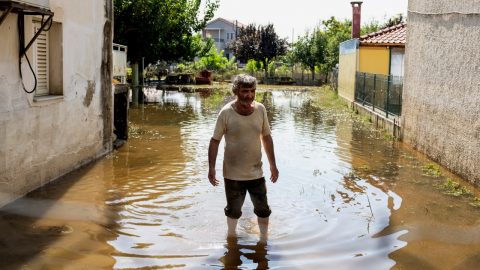Secretary-General António Guterres warned the U.N. General Assembly in New York on Tuesday that the world has become increasingly defined by the “great fracture” between Washington and Beijing.
In a doom-laden speech, he said the United States and China are “moving in a very dangerous direction,” with divisions based on trade and technology that could easily escalate into a military conflict.
“We must do everything to avoid a new Cold War. We are moving in a very dangerous direction,” Guterres told the largely virtual summit. “Our world cannot afford a future where the two largest economies split the globe in a great fracture.”
He added, “A technological and economic divide risks inevitably turning into a geo-strategic and military divide. We must avoid this at all costs.”
The summit marked the U.N.’s 75th anniversary but there was little in the way of celebration.
Instead Guterres warned world leaders that the “four horsemen” he has previously warned of — geopolitical tensions, the climate crisis, “growing global mistrust” and “the dark side” of the internet — had been joined by a “fifth horseman”: the coronavirus.
“Covid-19 has laid bare the world’s fragilities: rising inequalities, climate catastrophe, widening societal divisions, rampant corruption,” he said, evoking the spirit of the U.N.’s birth in 1945 by telling world leaders that they now faced their own “foundational moment.”
Though President Donald Trump has at times praised Chinese President Xi Jinping, the coronavirus crisis has seen relations between the world’s two most powerful economies crash to new lows.
Trump and his administration have clashed with China on trade, its expansion into the South China Sea, the crackdown of protesters in Hong Kong and accusations of human rights violations on its Muslim Uighur minority.
Appearing by video link, Xi told the assembly that his country had no intention of fighting “either a Cold War or a hot war with any country.”
Xi called for countries to “enhance solidarity and get through this together” — perhaps an implicit criticism of Trump’s often adversarial, go-it-alone approach. “Any attempt of politicizing the issue, or stigmatization, must be rejected.”
Trump, meanwhile, used his taped speech to attack Beijing directly.
“We must hold accountable the nation which unleashed this plague onto the world, China,” he said. “The Chinese government, and the World Health Organization — which is virtually controlled by China — falsely declared that there was no evidence of human-to-human transmission.”
Zhang Jun, the country’s ambassador to the U.N., rejected Trump’s allegations as “baseless” and said that “lies repeated a thousand times are still lies.”
Xi continued to distinguish himself from Trump by using his speech to announce that China will transition to carbon neutrality before 2060, and peak its emissions before the end of the decade.
Download the NBC News app for breaking news and politics
“We call on all countries to pursue innovative, coordinated, green and open development for all,” Xi said, adding the world should commit to achieving “a green recovery” from Covid-19.
Xi also spoke of the importance of meeting the targets set in the 2015 Paris Agreement on climate change, an accord from which Trump wants to withdraw.
The announcement “caught many of us by surprise,” said Li Shuo, senior climate and energy policy officer at Greenpeace in Beijing. “It is clearly a carefully calculated move, just a few minutes after President Trump’s speech to maximize the contrast of the climate resolve between China and the U.S.”
China has previously been criticized for including coal power stations as part of its recovery from the coronavirus pandemic, whereas the Trump administration has relaxed some regulations on polluting industries.
China is the world’s biggest polluter, accounting for 28 percent of global CO2 emissions. Americans, however, are responsible for 15 percent, over twice as much per capita.









Recent Comments